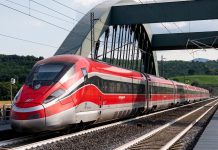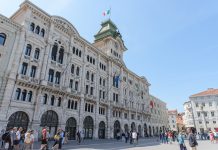by Maximiliano Crocamo
Interview: FVG councilor for tourism and productive activities, Sergio Bini
Regional Councillor for Productive Activities and Tourism Sergio Emidio Bini emphasized the central role of local economic development consortia in fostering regional growth during a conference in Trieste on Wednesday.
“The importance of local development consortia as engines of growth for our territories is evident,” Bini said at the event, titled “The Clean Industrial Deal Europe: The Contribution of Ecologically Equipped Production Areas.” “Public intervention plays a crucial role by providing the fuel necessary to keep the engine of development running. Over the past six years, we have allocated more than 300 million euros to these consortia, generating tangible results through new urban infrastructure and services for businesses. These initiatives have, in turn, activated nearly half a billion euros in private investments and created significant employment opportunities.”
The conference marked the conclusion of the Ecole project, launched in 2022 with a total budget of 2.3 million euros. The initiative brought together institutional partners, local development consortia, and innovation centers from Italy, Slovenia, Austria, France, and Germany. Among the Italian participants were the Giulian Area Local Development Consortium (Coselag) and Verona’s Zai Consortium. The project produced tools and guidelines for the sustainable management of industrial parks, along with comparative analyses, pilot cases, and transnational cooperation efforts aimed at reducing environmental impact and improving resource efficiency.
Bini noted that regional consortia have undergone significant transformation in recent years. Originally focused on property management, many have evolved into organizations offering a range of business services. “They no longer just provide space,” Bini explained, “but also infrastructure, logistics support, tools for ecological transition, and services for workers — all in line with the challenges of competitiveness and sustainability.”
A central part of this shift is the development of Aree Produttive Ecologicamente Attrezzate (Apea), or ecologically equipped production areas, which Bini described as “a key component of this virtuous system.”
“The Region moved early to introduce a management model for industrial zones oriented toward sustainable transition,” he said. Since 2022, the regional government has financed 18 active projects across all regional consortia, with approximately one million euros invested in an experimental phase nearing completion. The Apea model provides companies with economies of scale, shared services, reduced energy and water costs, and increased resource circularity, while also granting access to regional incentives and dedicated funding opportunities.
Bini also addressed challenges posed by European environmental policies. “The European Union, through sometimes overly rigid policies such as the Green Deal, has not always made this development path easy,” he said. “Nevertheless, the work carried out at the regional level has enabled us to deliver concrete results for businesses.”




























